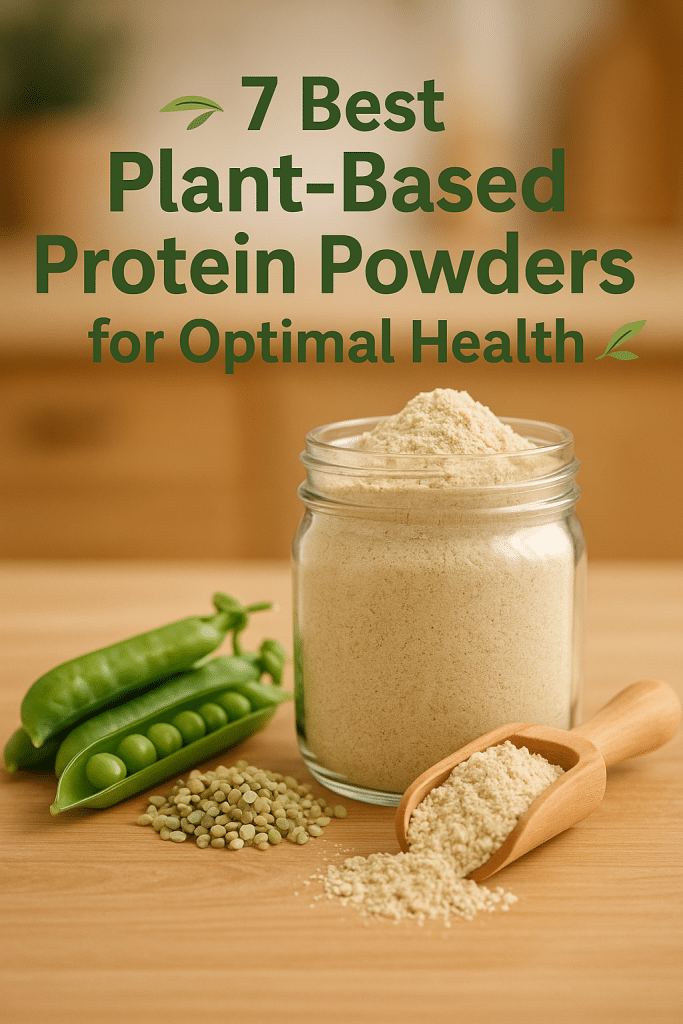If you’re a health-conscious adult searching for trusted wellness solutions, finding the best plant based protein powder is essential to meet your nutritional needs while aligning with your values and lifestyle. Whether your goals include muscle gain, weight management, or simply enhancing your daily nutrition with a clean, vegan source of protein, plant-based powders offer versatile, nutrient-rich alternatives to traditional animal proteins. But with so many options on the market, how do you pick the one that truly supports your health goals and tastes great?
In this comprehensive article, I’ll walk you through everything you need to know—from understanding the unique benefits of plant-based protein powders and the critical criteria to watch for, to in-depth reviews of seven top contenders. You’ll gain expert insights into their nutritional profiles, flavor options, clean-label certifications, and ideal use cases. Plus, I’ll share practical tips on integrating these supplements into your routine and address common concerns like digestibility, allergens, and ethical sourcing. Ready to elevate your plant-powered nutrition? Let’s dive into the best plant based protein powders designed to fuel your health optimally.
Understanding Plant-Based Protein Powders: Why Choose Them?
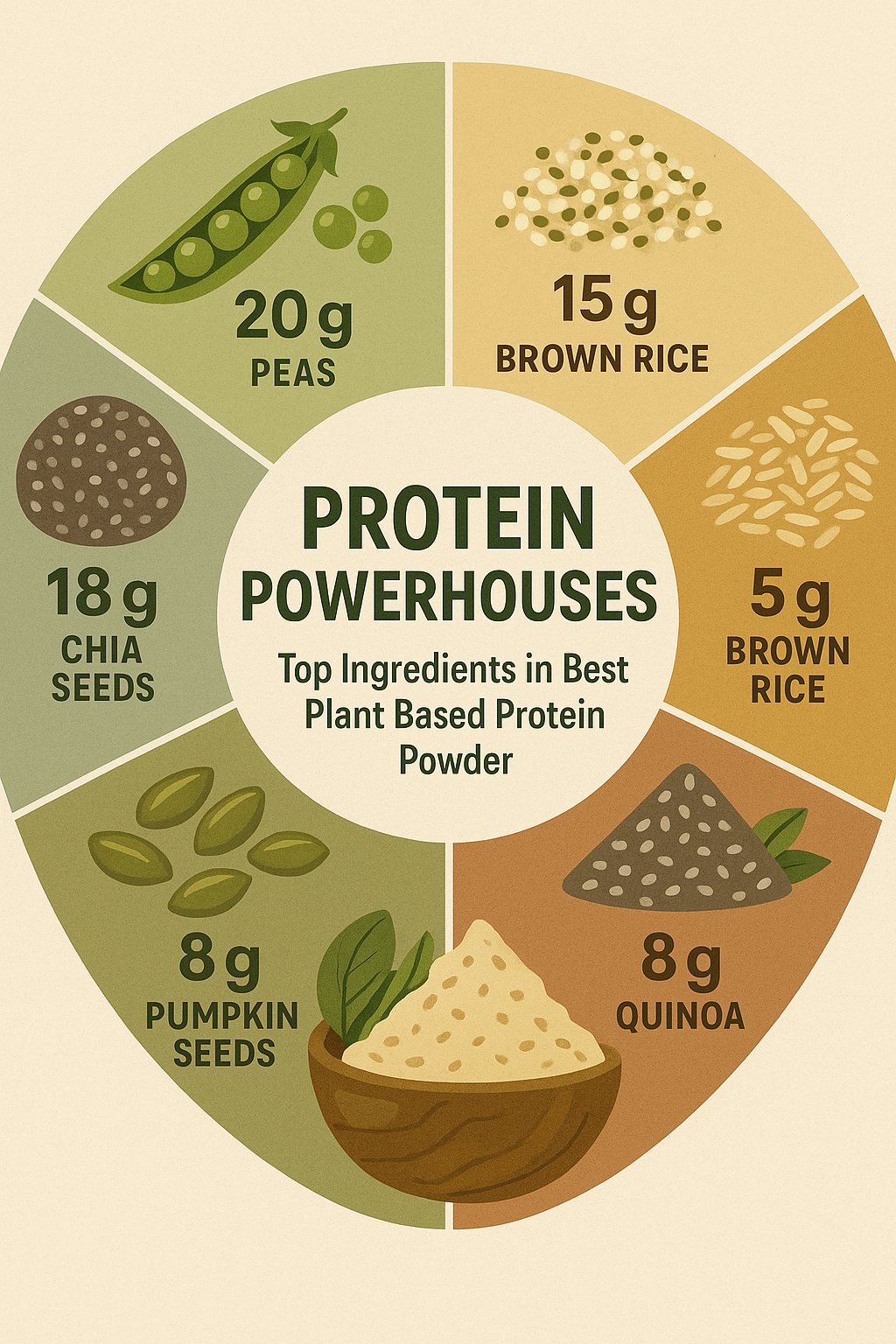
Plant-based protein powders have surged in popularity across health-conscious communities, and for good reason. Choosing them means you’re not just investing in your well-being—you’re supporting sustainability and embracing a versatile nutrition source that many find easier on digestion than animal-based counterparts.
Health Benefits of Plant-Based Proteins
Plant-based proteins offer a range of advantages critical for holistic wellness:
- Lower in Saturated Fats and Cholesterol: Unlike many animal proteins, plant-based powders generally contain no cholesterol and less saturated fat, which supports heart health and reduces inflammation risks.
- Rich in Fiber: Many plant proteins, like pea, chia, and brown rice, contribute dietary fiber, improving gut health and promoting satiety, which can be beneficial for weight loss or maintenance.
- Phytonutrients & Antioxidants: Plant sources often include beneficial compounds such as antioxidants and vitamins that counter oxidative stress and support overall immune function.
- Sustainability: Producing plant-based proteins requires fewer resources and emits less greenhouse gas compared to animal farming, aligning with eco-conscious choices.
- Allergy-Friendly Options: Many powders avoid common allergens like dairy, soy, and gluten, offering options for sensitive stomachs or dietary restrictions.
These benefits align well for those targeting muscle gain, weight management, or simply cleaner nutrition without compromising on protein intake.
Common Plant Protein Sources and Their Nutritional Profiles
Understanding the protein sources inside powders is key to evaluating quality:
- Pea Protein: Derived from yellow split peas, pea protein is rich in BCAAs, highly digestible, and hypoallergenic. It delivers roughly 20-27 grams of protein per serving depending on the brand.
- Brown Rice Protein: Contains a complete amino acid profile except for lysine in low amounts. Usually combined with pea protein to balance the amino acid profile.
- Hemp Protein: Offers protein, omega-3 fatty acids, fiber, and minerals. It’s popular for its rich nutrient density but is lower in total protein per serving than pea or rice.
- Pumpkin Seed and Sunflower Seed Proteins: These seeds are nutrient-dense, offering minerals, healthy fats, and moderate protein contributing to amino acid variety.
- Chia Seeds: Provide fiber, omega-3s, antioxidants, and modest protein.
- Amaranth, Quinoa, and Algae: These less common proteins add unique micronutrients and promote amino acid completeness.
Blending multiple plant proteins can yield a complete amino acid spectrum crucial for muscle repair and growth.
Plant-Based Protein Powders vs. Animal-Based Proteins: What to Expect
Compared to whey, casein, or egg proteins, plant-based powders often differ in key ways:
- Amino Acid Profile: While most animal proteins are “complete” (containing all nine essential amino acids in adequate amounts), some individual plant proteins lack one or more essential amino acids. Blends typically compensate for this.
- Digestibility: Whey is fast-digesting; some plant proteins digest more slowly or can cause mild digestive discomfort in sensitive individuals. However, advances in processing and enzyme additions have improved plant protein digestibility vastly.
- Taste and Texture: Plant powders sometimes have a distinct earthy or grainy taste, which can be balanced with natural flavors and sweeteners.
- Allergen Considerations: Animal proteins contain lactose or milk proteins that can trigger allergies or intolerances, whereas plant-based powders cater more easily to dairy-free lifestyles.
- Clean Label Ingredients: Many plant-based powders pride themselves on organic, non-GMO, and minimal additive formulations.
Choosing the best plant based protein powder hinges on your personal preferences concerning these factors.
Key Criteria to Select the Best Plant-Based Protein Powder
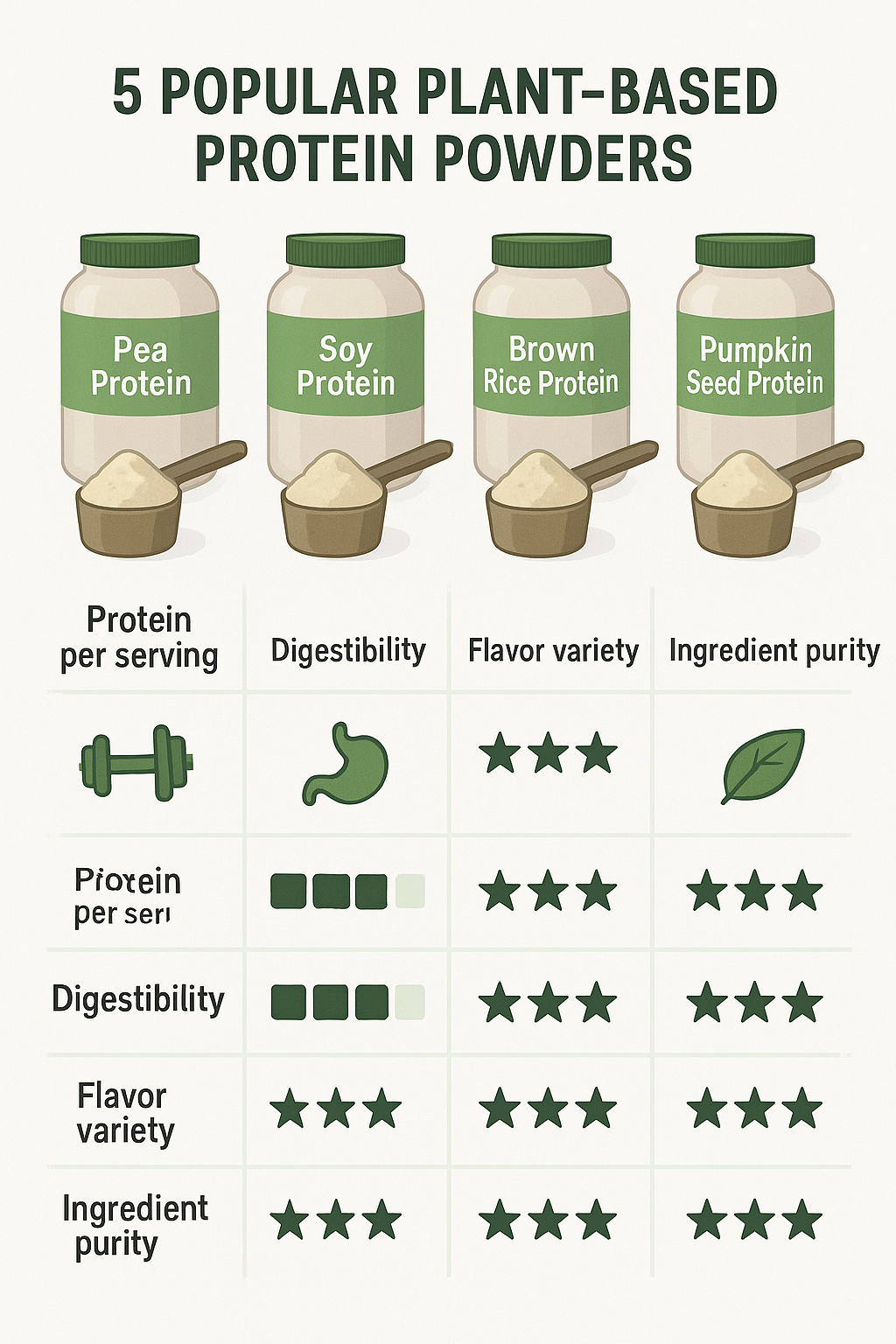
When scouting for your ideal protein powder, these critical factors should guide your decision:
Protein Content and Amino Acid Completeness
Aim for powders providing at least 20 grams of protein per serving to optimally support muscle gain or recovery. Check that the powder offers a complete amino acid profile, often achieved through blends combining complementary proteins like pea + rice or pea + hemp. A good powder also contains branched-chain amino acids (BCAAs — leucine, isoleucine, valine) which are pivotal for muscle protein synthesis.
For example, Vega Sport Premium Protein boasts 30 grams of protein and 5 grams of BCAAs per serving, ideal for athletes.
Digestibility and Bioavailability Factors
Digestive comfort is crucial. Powders enhanced with digestive enzymes like protease, amylase, or bromelain can help reduce bloating and improve nutrient absorption. Also, consider powders made with minimal fillers and artificial ingredients to ease digestion.
PlantFusion Complete Plant-Based Protein combines protein blends plus digestive enzymes, easing absorption.
Added Nutrients: Fiber, Probiotics, and Micronutrients
Look for powders enriched with dietary fiber and probiotics to support gut health and promote regularity. Micronutrients such as iron, calcium, and magnesium further elevate nutritional value.
Vega Sport Premium Protein includes 2 billion CFU probiotics per serving to support digestive wellness.
Clean Label Considerations: Organic, Non-GMO, Allergen-Free
Choose powders certified USDA Organic or bearing the Non-GMO Project Verified seal for purity and transparency. Allergen-friendly options should be free from soy, gluten, dairy, and artificial additives.
For example, Orgain Organic Plant Based Protein Powder is USDA organic, vegan, gluten-free, and soy-free.
Flavor, Texture, and Sweetener Choices
Powder palatability matters—especially if you drink it daily. Pick powders with natural sweeteners like stevia or monk fruit instead of artificial alternatives. Texture should blend smoothly into beverages or recipes without grittiness.
KOS Organic Plant Protein offers a pleasing flavor variety with natural sweeteners and subscription options.
7 Top Plant-Based Protein Powders Reviewed and Compared
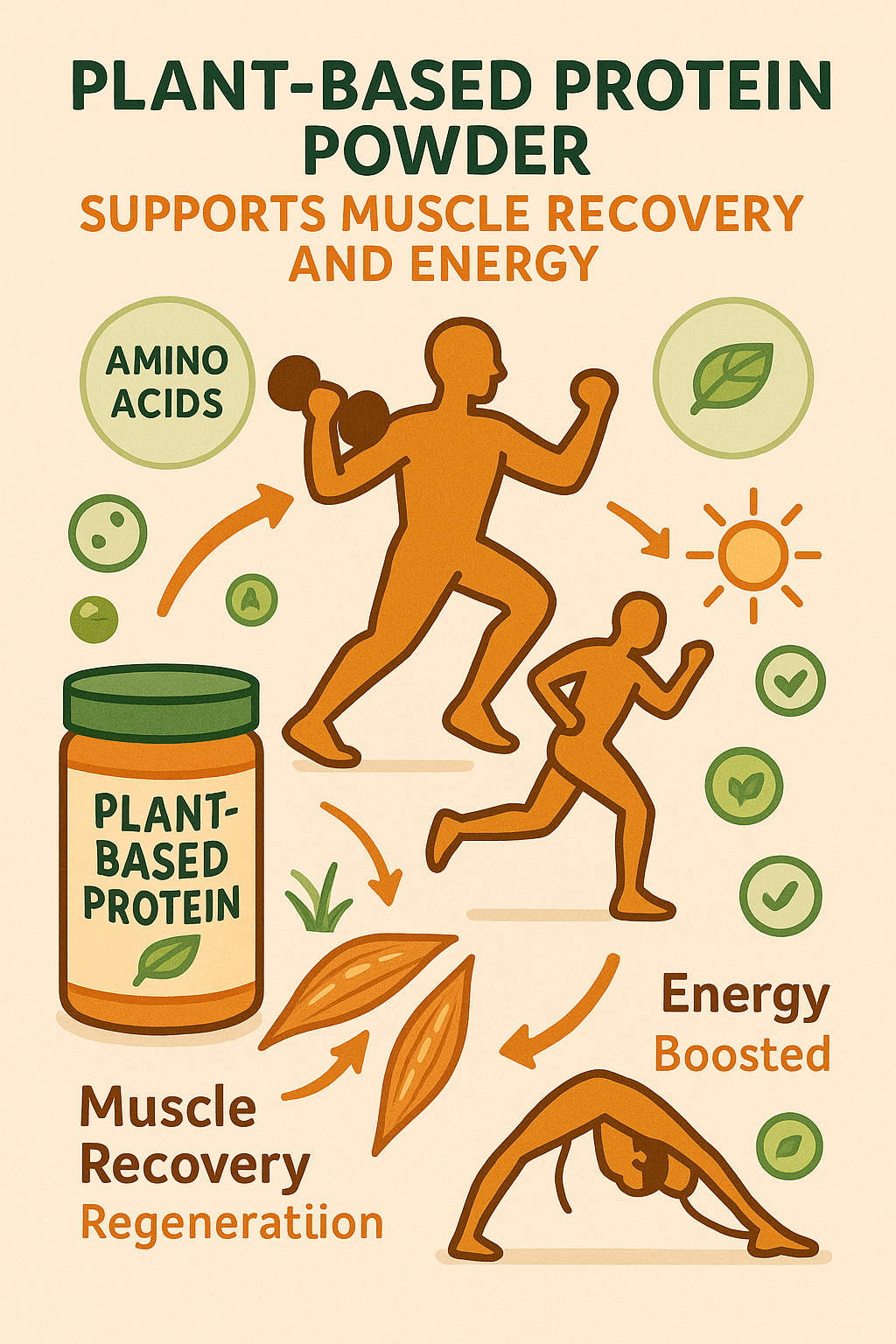
Let’s explore seven standout options that excel in various key areas.
1. Orgain Organic Plant Based Protein Powder
Nutritional Highlights and Benefits
Providing 21 grams of organic plant protein from a blend of pea, brown rice, and chia seeds per serving, Orgain also offers 6 grams of organic fiber and zero sugars. It’s designed to be clean, simple nutrition without fillers or artificial additives.
Clean, Organic, and Vegan Certification Details
- USDA Organic certified
- Vegan, gluten-free, soy-free
- Non-GMO
- Free of artificial colors, flavors, preservatives
Ideal Use Cases and Taste Options
Available in Vanilla Bean, Creamy Chocolate Fudge, and Strawberries n Cream flavors, Orgain is perfect for morning smoothies, shakes post-workout, or even baking. Its smooth blendability makes it a user favorite with a mild, pleasant taste.
Purchase options:
2. Vega Sport Premium Protein
Muscle Recovery and Amino Acid Profile Focus
An athlete-oriented protein powder with a hefty 30 grams of protein using pea, alfalfa, pumpkin seed, and sunflower seed proteins. Includes 5 grams BCAAs and tart cherry extract for added recovery benefits.
Probiotic Addition and Flavor Variants
Contains 2 billion CFU probiotics for gut health support. Flavors include Chocolate, Vanilla, and Berry, catering to different palates.
Available at myvega.com, Amazon, GNC, and Walmart.
3. Garden of Life Raw Organic Protein
Raw, Nutrient-Dense Formula with Greens
Combines 13 raw organic sprouted proteins, probiotic and enzyme blends, along with greens like kale and spinach. Provides 22 grams protein per serving and extra nutrients beyond protein.
Certifications and Dietary Suitability
- USDA Organic
- Vegan, gluten-free, soy-free
- Non-GMO verified
Available at Garden of Life’s official website, Amazon, Whole Foods, and Target.
4. Sunwarrior Warrior Blend
Unique Protein Blend with MCTs for Energy Support
Combines pea, hemp, goji berry proteins to deliver a complete profile. Includes MCTs sourced from coconuts enhancing energy metabolism—a great edge for active lifestyles.
Amino Acid Completeness and Clean Ingredients
Soy-free, gluten-free, vegan, non-GMO, free of artificial additives. Available in chocolate, vanilla, and unflavored.
Buy directly from Sunwarrior or retailers like Amazon and Walgreens.
5. Naked Pea – 100% Pea Protein Powder
Single-Ingredient Purity and Environmental Sourcing
Made solely from yellow pea protein from sustainable North American farms, ensuring purity with no sweeteners or additives.
High Protein and BCAA Content
Each serving delivers 27g protein, 5.7g BCAAs, supporting muscle repair with minimal carbs and sugars.
Available via Naked Nutrition, Vitabloom Essentials, and B Well Always.
6. KOS Organic Plant Protein
Flavor Variety and Subscription Availability
Known for delicious flavors like Chocolate, Vanilla, and Strawberries & Cream with options to subscribe and save regularly.
Organic Ingredients and Nutritional Profile
Features 20 grams of organic protein per serving from pea, flaxseed, quinoa, pumpkin seed, and chia seed. Non-GMO and vegan-approved.
Available at KOS, Amazon, Walmart, and other outlets.
7. PlantFusion Complete Plant-Based Protein
Complete Amino Acid Profile with Digestive Enzymes
Contains a blend of pea, artichoke, amaranth, quinoa, and algae proteins. Boosted with digestive enzymes and BCAAs for muscle building and reduced bloating.
Benefits for Muscle Building and Sensitive Stomachs
Dairy, soy, and gluten-free, PlantFusion is suitable for those with sensitivities and aims to maximize protein absorption.
Available from PlantFusion, Target, and Amazon.
How to Integrate Plant-Based Protein Powders into Your Daily Routine
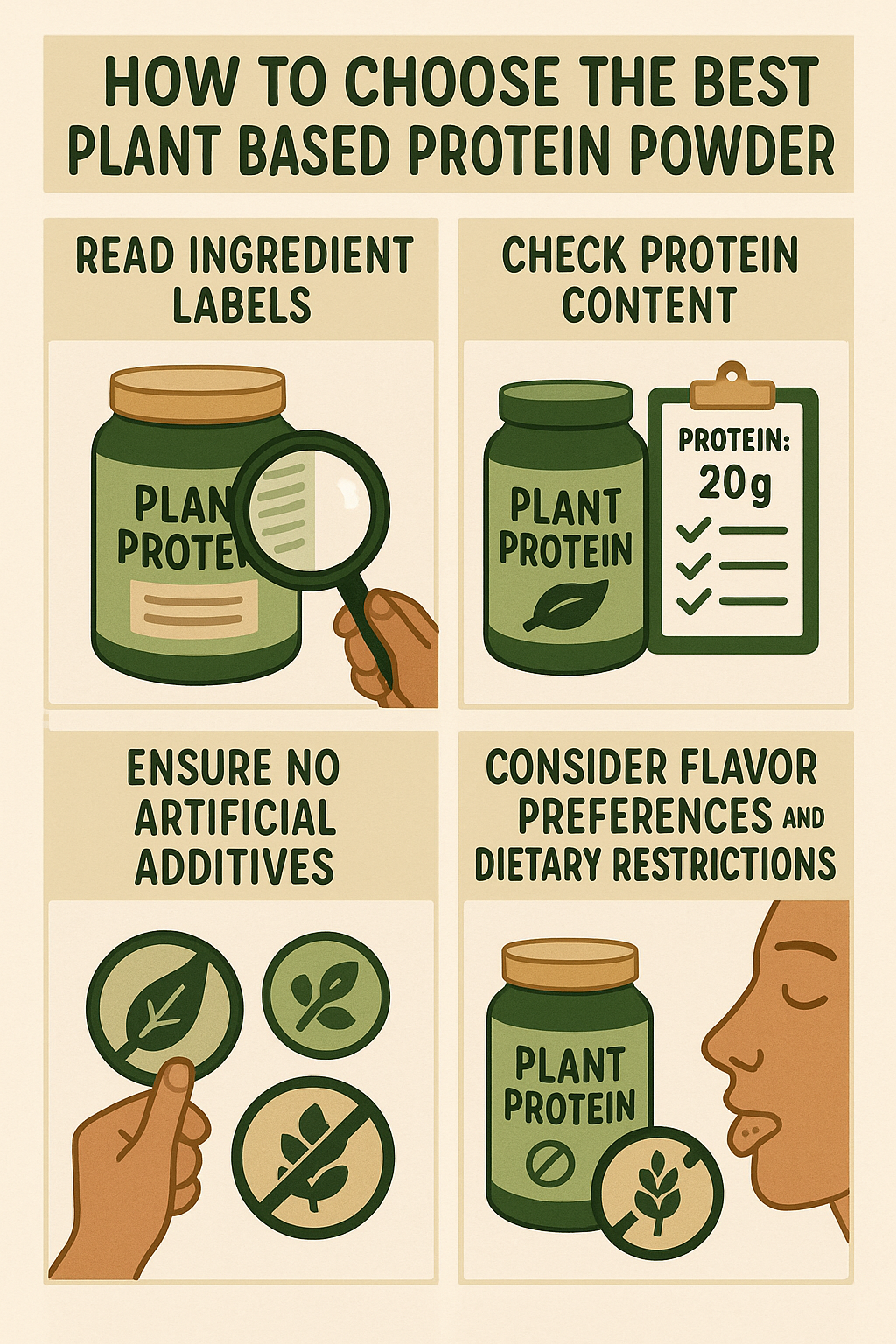
Best Practices for Smoothies, Baking, and Meal Replacement
Adding your protein powder to smoothies is the most popular method—combine with fruits like berries or banana and plant milk for a nutrient-rich shake. You can also incorporate protein powder into oatmeal, pancakes, or homemade bars for variety.
For baking, substitute up to 1/4 cup of flour with protein powder in recipes like muffins or brownies to boost protein content without altering texture.
Timing Your Protein Intake for Muscle Gain and Recovery
For muscle gain or post-workout recovery, consuming protein within 30 to 60 minutes after exercise maximizes muscle protein synthesis. However, spreading protein intake evenly throughout the day supports consistent recovery and prevents muscle breakdown.
Addressing Common Concerns with Plant-Based Protein Powders
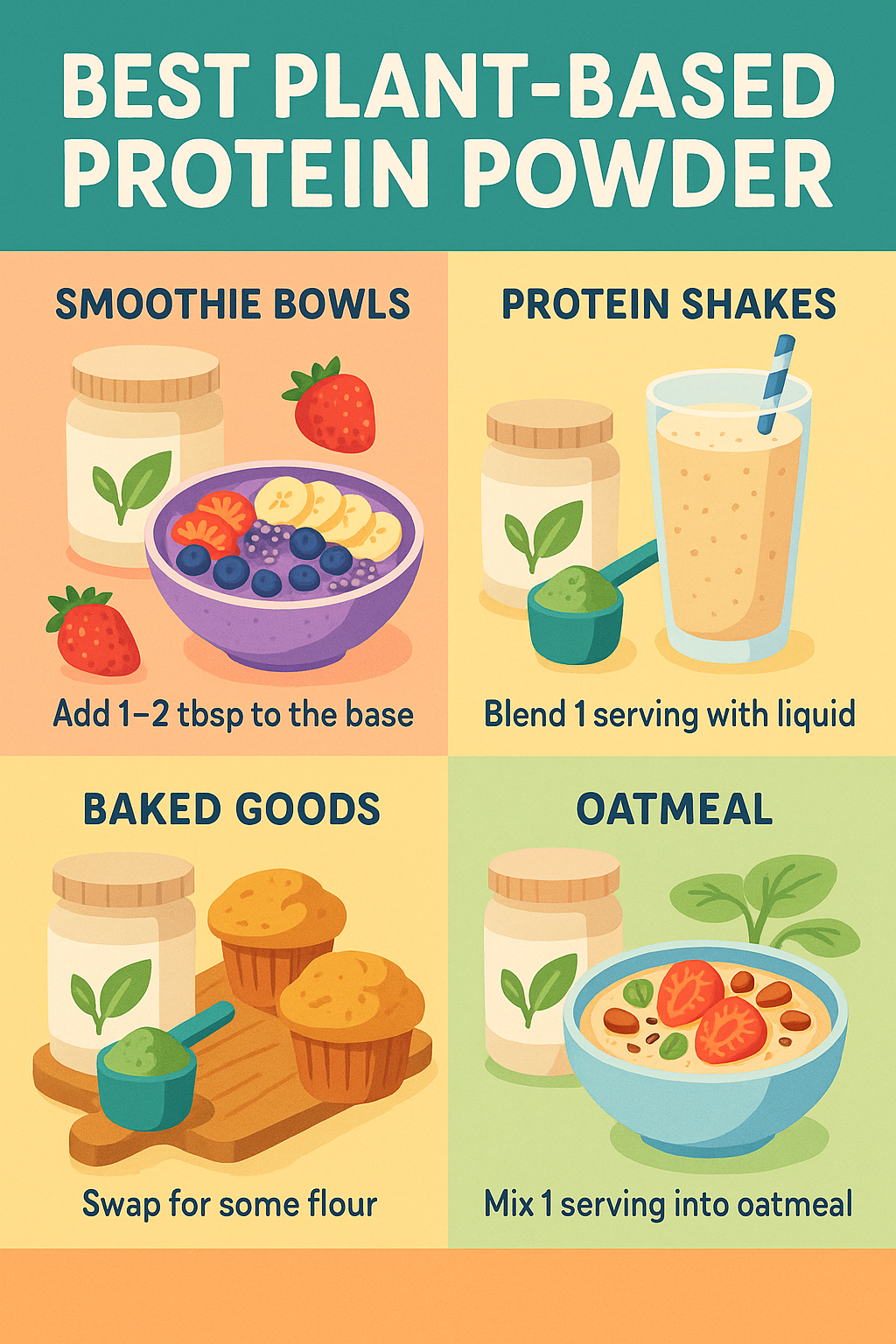
Managing Digestive Issues and Allergens
Some plant proteins can cause gas or bloating, especially if you’re new to them. Start with smaller doses and increase gradually. Look for powders with added enzymes or probiotic blends, like those in PlantFusion or Vega Sport, to ease digestion.
Understanding Sweeteners: Natural vs Artificial
Powders sweetened naturally with stevia or monk fruit avoid artificial additives and sugars that may cause cravings or digestive discomfort. Always read labels—brands like Orgain and KOS use natural sweeteners exclusively.
Ensuring Sustainability and Ethical Sourcing
Beyond your health, consider powders with transparent sourcing and environmental responsibility. Naked Pea highlights sustainable North American farms. Choosing USDA Organic and Non-GMO certifications also promotes eco-friendly practices.
The Unique Edge: Combining Plant-Based Proteins with Gut Health Enhancers
The Role of Probiotics and Fiber in Protein Powders
Incorporating probiotics and prebiotic fiber into protein powders supports beneficial gut bacteria, which in turn improves digestion and immune function. Vega Sport and Garden of Life include these ingredients, aiding not just protein absorption but overall well-being.
How Gut Health Improves Protein Absorption and Overall Wellness
A healthy gut lining better absorbs amino acids, vitamins, and minerals essential for muscle repair and energy. Supporting gut microbiota with fiber and probiotics also reduces inflammation and may boost mood and energy levels.
Where to Buy Reliable and Affordable Plant-Based Protein Powders
Trusted Online Retailers and Subscription Models
Most brands provide direct e-commerce options:
Subscription models often offer discounts and regular deliveries.
Navigating Physical Store Options and Comparing Prices
Retail chains like Whole Foods, Walgreens, Walmart, Target, GNC, and Costco usually stock popular plant protein powders. Comparing prices, sizes, and flavors in-store can help find the best deals—Costco, for example, offers bulk options of Orgain.
Conclusion: Choosing the Best Plant-Based Protein Powder for You
Selecting the best plant based protein powder is a personal journey, blending your dietary goals, taste preferences, and lifestyle. Whether you prioritize muscle building with Vega Sport’s high protein and probiotic punch, crave the clean, organic simplicity of Naked Pea, or want a nutrient-dense option like Garden of Life’s Raw Organic Protein, you’ll find a product that fits your needs.
Be open to trying samples or smaller sizes when possible, as texture and flavor can heavily influence your enjoyment and consistency. Remember, integrating plant-based proteins into your routine isn’t just about meeting protein numbers—it’s about embracing a sustainable, healthful lifestyle that energizes and supports you for years to come.
So, why wait? Explore your options, experiment with your favorites, and fuel your wellness journey with confidence!
FAQs
1. What is the best plant based protein powder for muscle gain?
For muscle gain, look for powders high in protein per serving (above 25 grams) and rich in branched-chain amino acids (BCAAs). Vega Sport Premium Protein with 30 grams protein and 5 grams BCAAs is an excellent choice.
2. Which plant-based protein powder is best for sensitive stomachs?
PlantFusion Complete Plant-Based Protein includes digestive enzymes to reduce bloating and ease digestion. Naked Pea, made of 100% pure pea protein, is also gentle and free from common allergens like soy and dairy.
3. Are organic plant-based protein powders better?
Organic powders like Orgain Organic Plant Based Protein avoid synthetic pesticides and offer cleaner ingredients. They’re often non-GMO and provide a higher assurance of purity and sustainability.
4. Can plant-based protein powders help with weight loss?
Yes, many plant-based powders are high in fiber and low in sugar, promoting satiety to help control appetite. Orgain’s formula with 6 grams fiber and zero sugar supports weight management effectively.
5. What natural sweeteners are used in plant protein powders?
Natural sweeteners commonly used include stevia and monk fruit. They provide sweetness without calories or artificial additives, used in products like KOS Organic Plant Protein and Orgain.
Quick Takeaways/Key Points
- Plant-based protein powders provide a heart-healthy, fiber-rich, and sustainable protein source.
- Aim for powders with a complete amino acid profile to optimize muscle repair.
- Digestive enzyme and probiotic additions improve gut health and nutrient absorption.
- Organic, non-GMO, and allergen-free certifications ensure product purity and safety.
- Popular powders include Orgain, Vega Sport, Garden of Life, Sunwarrior, Naked Pea, KOS, and PlantFusion.
- Integrate powders into smoothies, baking, or meals and time intake post-exercise for best results.
- Check labels for natural sweeteners and avoid artificial additives when possible.
Ready to make the switch or upgrade your current supplement? Exploring these top plant-based protein powders will empower you to choose a cleaner, more effective protein source that honors both your body and your values.

